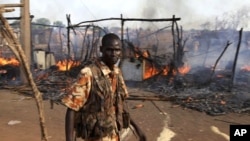The simmering conflict between Sudan and South Sudan has yet to escalate into full-scale war, but it threatens to deepen a humanitarian crisis that is already bringing hunger and misery to hundreds of thousands of people along the two countries’ border, according to U.S. officials who testified on Capitol Hill Thursday.
Can a devastating war be averted between Sudan and South Sudan? That was the top question asked by members of the House of Representatives Committee on Foreign Affairs.
Republican Representative Christopher Smith:
“As we meet here today, the two countries move ever-closer to all-out war," said Smith. "And some strategy to avert this eventuality must be devised soon, if it has not already been created.”
The hope and optimism that prevailed last year, when South Sudan became the world’s newest country, has given way to an economically crippling oil dispute, bombing campaigns, cross-border skirmishes, and accusations and counter accusations between Juba and Khartoum.
U.S. Special Envoy for Sudan Princeton Lyman said the situation, while dire, is not yet a full-scale war. He stressed the need for a resumption of negotiations, saying that the two countries have much to address. But Lyman told the committee that the task is complicated by a rebel conflict in Sudan’s southernmost regions that has displaced many civilians and cut off their access to food.
“The situation in Southern Kordofan and Blue Nile - there will be no security on the border until that situation is addressed," said Lyman. "It is a political problem; it is also a tremendous humanitarian problem. And we have since last year been raising the issue of a looming humanitarian crisis in these areas.”
Also testifying before the committee was Nancy Lindborg of the U.S. Agency for International Development, who said a bad situation could grow far worse.
“A direct confrontation between the south and the north would absolutely further derail the ability to make progress on the humanitarian situation, whether in the South or Darfur, or elsewhere," said Lindborg. "Unfortunately, we are already seeing many [aid] donors having to shift their resources from a development agenda to a humanitarian agenda, so we are at risk of losing a lot of that progress.”
Lindborg said the oil dispute between South Sudan, which produces the commodity, and Sudan, through which it is transported for distribution, will stunt development and harm ordinary citizens.
“The decision to halt oil production will have critical impact on the people of South Sudan," she said. "That was 98 percent of the government revenue, and it has prompted an austerity budget that means it will be impossible for South Sudan to fund some of its core operations, including to sustain some of the really important progress that has been made in recent years in improving school attendance, access to clean water, health.”
Special envoy Lyman said it is up to the leaders of Sudan and South Sudan to settle their differences and forge a peaceful coexistence. That task might be aided by what he sees as an increasingly unified international community pushing the two countries to make progress at the negotiating table.
“The U.N. Security Council is now more unified than it has been on Sudan," he said. "And with the African Union communique, the Arab League coming in along the same lines and the Security Council coming in along the same lines, we hope that will strengthen the panel’s political weight, if you will, as they bring these parties to the table.”
Lyman said he hopes the two countries will begin to address border concerns in coming weeks, and that leaders will eventually hold a summit to address major issues like oil production.
The African Union has threatened to impose binding rulings on Sudan and South Sudan, if the countries fail to reach agreements on their own.
News
US Officials Press for Sudan-South Sudan Talks









